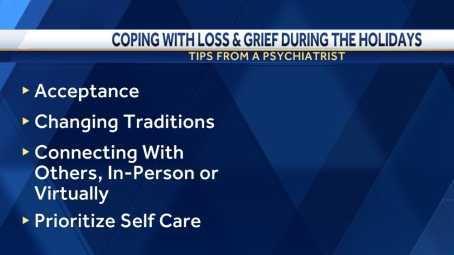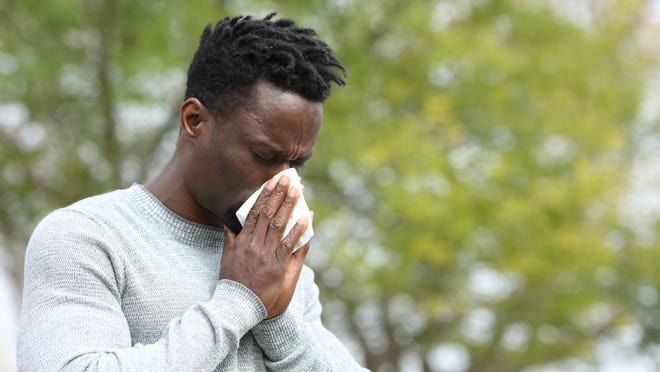

As people enter into a second holiday season in the COVID-19 pandemic, so many are dealing with the loss of a loved one. Dr. Ruth Benca, a psychiatrist with Atrium Health Wake Forest Baptist in North Carolina, said she's seen significantly higher rates of depression, anxiety, stress-related illnesses and trouble sleeping over the course of the pandemic. Now, she and other mental health professionals are anticipating the holidays will only add to those issues."There are probably many layers of guilt, particularly with these losses," Benca said. "They think, 'I shouldn't be having a happy time right now because I'm here.' That's survivor's guilt. So I think it's really important to face that, but not do that to yourself. Not beat yourself up. It's important to be accepting of yourself and also be accepting about what you do feel able to do or not over the holidays."Benca said self-checks and self-care are critically important over these next few weeks. She recommends prioritizing sleep and taking time for yourself to work out or just get outside to absorb some sunshine. The doctor also said, when checking in with friends and family, to attempt some kind of face-to-face contact. She said phone calls are helpful, but the most effective way to connect would be over FaceTime or in-person. The holidays also bring up a lot of traditions with loved ones. For many, COVID-19 meant the sudden loss of that person you had a tradition with or the inability to visit them. Benca said you have two options: either continue doing those traditions in honor and memory of them OR find a new tradition that will bring you joy. She reminds patients they can always come back to those previous traditions in a few years when they feel more manageable. Benca said if the feelings are overwhelming to a point of a crisis, to see professional help. You can also always call the National Helpline at 1-800-273-8255.
As people enter into a second holiday season in the COVID-19 pandemic, so many are dealing with the loss of a loved one.
Dr. Ruth Benca, a psychiatrist with Atrium Health Wake Forest Baptist in North Carolina, said she's seen significantly higher rates of depression, anxiety, stress-related illnesses and trouble sleeping over the course of the pandemic. Now, she and other mental health professionals are anticipating the holidays will only add to those issues.
"There are probably many layers of guilt, particularly with these losses," Benca said. "They think, 'I shouldn't be having a happy time right now because I'm here.' That's survivor's guilt. So I think it's really important to face that, but not do that to yourself. Not beat yourself up. It's important to be accepting of yourself and also be accepting about what you do feel able to do or not over the holidays."
Benca said self-checks and self-care are critically important over these next few weeks. She recommends prioritizing sleep and taking time for yourself to work out or just get outside to absorb some sunshine.
The doctor also said, when checking in with friends and family, to attempt some kind of face-to-face contact. She said phone calls are helpful, but the most effective way to connect would be over FaceTime or in-person.
The holidays also bring up a lot of traditions with loved ones. For many, COVID-19 meant the sudden loss of that person you had a tradition with or the inability to visit them. Benca said you have two options: either continue doing those traditions in honor and memory of them OR find a new tradition that will bring you joy. She reminds patients they can always come back to those previous traditions in a few years when they feel more manageable.
Benca said if the feelings are overwhelming to a point of a crisis, to see professional help. You can also always call the National Helpline at 1-800-273-8255.
Source link








